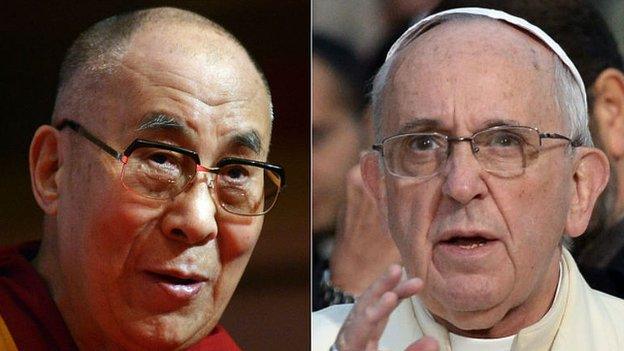Will the Dalai Lama reincarnate?
- Published
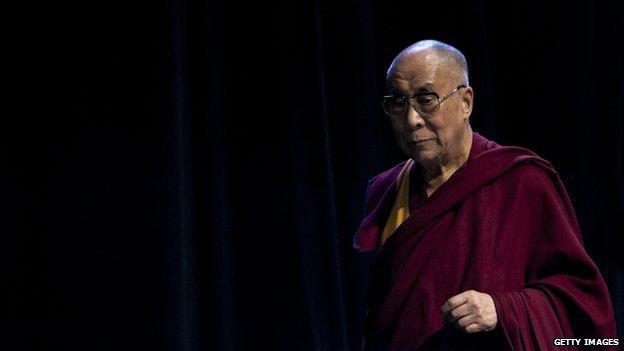
The Dalai Lama won the Nobel Peace Prize in 1989
It is one of the most sensitive political issues in China: who has authority in Tibet? Many Tibetans revere the Dalai Lama and support his goal of greater autonomy from Beijing.
But to Chinese officials, the exiled spiritual leader is a traitor.
The role of Dalai Lama has been filled for centuries through "reincarnation". The current Dalai Lama, the 14th, turns 80 this year, and Beijing is keen to control the process of finding the 15th.
But the present Dalai Lama has said the role will one day end. Better to have no Dalai Lama than "a stupid one".
So, will he reincarnate? The BBC World Service's The Inquiry programme hears from four expert witnesses.

Chonpel Tsering: Reincarnation process must not be manipulated
Chonpel Tsering is the Dalai Lama's representative in northern Europe.
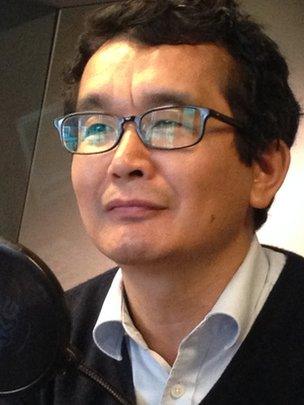
Chonpel Tsering insists the question of reincarnation is one for the current Dalai Lama alone
"I genuinely don't know [whether he will reincarnate]. Tibetan Buddhism believes that everybody is reborn, but not everybody can choose how and when they are reborn.
"The lamas - the senior religious figures - are able to determine firstly whether they are reborn, and if they are going to be reborn, where they'll be reborn.
"The present carnation, the present Dalai Lama, can decide. The rebirth is his choice.
"First, he is going to consult the Tibetan people and others that follow Tibetan Buddhism to find out whether they think that there should be a 15th Dalai Lama.
"If the decision is, 'Yes,' then he will set out clear instructions about the process, so that there is no ambiguity, so that the reincarnation process isn't manipulated or misused by anybody for their own personal or political interests.
"The Chinese and the Communist Party have set up systems where reincarnations such as his holiness the Dalai Lama have to be recognised and approved by the Communist Party.
"Maybe [they] feel that if they pick their own 15th Dalai Lama, somehow that authority will transfer on to the [one] lama they have picked.
"His holiness has said that the 15th would be born outside of Tibet, outside of China, because this 15th Dalai Lama would have to continue the work of the present Dalai Lama.
"If there is no genuine religious freedom inside Tibet, then it's very hard for him to continue that work."

Jia Xiudong: Dalai Lama is playing a political game
Jia Xiudong is senior research fellow at the China Institute of international studies in Beijing.
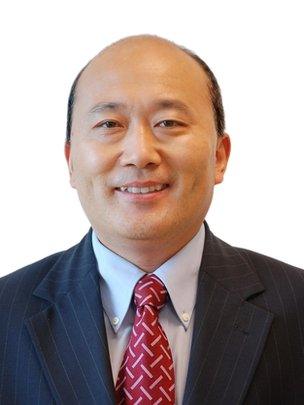
Jia Xiudong argues the reincarnation dispute is really about the sovereignty of Tibet
"I believe that the tradition will be maintained [and] the Dalai Lama will be reincarnated.
"There's a role for the current Dalai Lama to play for the reincarnation, but I believe he should not exaggerate that role.
"For example, he just cannot stop the tradition individually.
"It is tradition passed from centuries ago.
"The sovereign issue is the number one issue behind all the differences and dispute.
"So, it's not actually China's argument with the Dalai Lama.
"It's not about the freedom of religion.
"It is about sovereignty - whether Tibet can remain part of China.
"When he talks about reincarnation, many people in China believe that the Dalai Lama is playing a political game.
"The 14th Dalai Lama and those people around him who call for the independence of Tibet, they have made the issue of reincarnation, in a way, a political issue.
"He doesn't use the word 'independence', he says the 'highest autonomy', but to the ears of people here in China, when they look at the specific demands by the Dalai Lama, people believe that actually behind all those words of 'highest autonomy' it actually means 'independence'. So that is the problem.
"The government is concerned by the stability in Tibet because we believe that our experiences have shown that without stability you just cannot enjoy economic development, improvement of life.
"If the [reincarnation] tradition is followed, and then people see this tradition is still there, I think it will contribute to stability in Tibet."

Robert Barnett: China wants a 'tame' lama
Robert Barnett is director of the Modern Tibet Studies Programme at Columbia University in New York.
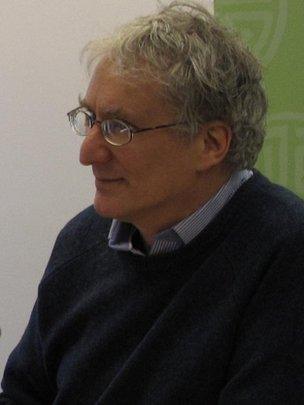
Prof Barnett says the Dalai Lama has been so effective his supporters will demand a successor
"Traditionally, at least in the last couple of hundred years, there was a role for both sides in this process.
"What's happening now in China is instead of just confirming the decision made by lamas about which child is a reincarnation, now the Communist Party is effectively saying it wants to decide whether a lama reincarnates at all, and even sometimes which child gets chosen. So this is a kind of mission creep for the state."
In 1995, the Dalai Lama named a six-year-old boy as the reincarnation of the second most important leader in Tibetan Buddhism, the Panchen Lama. But he was hidden away by the Chinese authorities and replaced by a boy of their choosing.
"They forced Tibetans to worship a certain child as the 11th Panchen Lama, when it's almost certain that no Tibetans actually believe that child is the 11th Panchen Lama.
"This is one of the most fascinating issues in the whole story: nobody in the Communist Party seems to have ever considered the possibility that they could rule Tibetans without a lama to be their intermediary.
"[It] seems to come out of an unquestioning idea that because Tibetans are often religious, they're therefore not susceptible to rational arguments about how wonderful Communism is and you have to persuade them through religion.
"So they have invested huge resources into trying to find a tame lama.
"They make films about the lama who supported the party in the 1930s, they made a TV series about another lama who supported the Communist Party and then they tried to develop these children who would become their supporters.
"Every time they've tried to do that it's failed. The children, when they grow up and become adults, either they flee to India to join the Dalai Lama or else they've turned into critics of the Communist Party from within the system.
"I think we have to look at all of this as negotiating moves on both sides. So the Dalai Lama is making these speculative, philosophical statements about, 'I might be coming back, I might not. I might come back as a woman.'
"This is his normal method as a Buddhist teacher of the kind that he is to make people think. But it's also a negotiating move with the Chinese to expose them to the kind of ridicule that they've put themselves in now by claiming to be able to arbitrate on matters like religion and reincarnation.
"This Dalai Lama has been so effective as a religious leader, even more so than as a political leader, that there's going to be huge force among his followers for him to come back. So it's quite likely that it's going to happen."

Jamyang Norbu: Dalai Lama must reincarnate for the sake of Tibet's future
Tibetan writer and activist Jamyang Norbu fell out of favour with the present Dalai Lama when he criticised his "softly softly" approach to China.
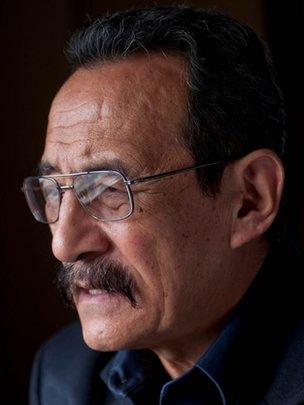
Jamyang Norbu insists the present Dalai Lama must reincarnate for the sake of Tibet
"He doesn't have much of a choice. The lama's reincarnating is a political institution.
"It'll have to be the choice of the Tibetan government in exile and of the people.
"China will have their candidate up and running, and you can be 100% sure that they will.
"They'll just pick some Tibetan kid who looks cute enough and they'll put him up there and they'll say, 'This is the Dalai Lama.'
"If we don't have our own candidate from the general Tibetan Buddhist world, then they win by proxy.
"They could have him repeating their party policies, saying, 'President Xi Jinping is a wonderful person,' that Tibetans must not aspire to any kind of freedom of expression or even independence, that they must be good Chinese and give up all their aspirations.
"The ideal place for the [next] Dalai Lama to be born is in the Himalayas on the Indian side of the border, where the people are ethnically Tibetan, where there are Tibetan Buddhists, [and] they're very loyal to the Dalai Lama, to the Tibetan spiritual world.
"So if he's born there, it would drag in the government of India. They would be obliged to protect him.
"A revolution is certainly coming to Tibet. We've had series of uprisings since the 1980s, and it's culminating now. So I cannot predict what will happen, when it'll happen but I know, it's a gut feeling - and you can see it through the progression of uprisings and acts of opposition to China - that a big revolution is surely overdue."
The Inquiry is broadcast on the BBC World Service on Tuesdays from 13:05 GMT. Listen online or download the podcast.
- Published12 March 2015
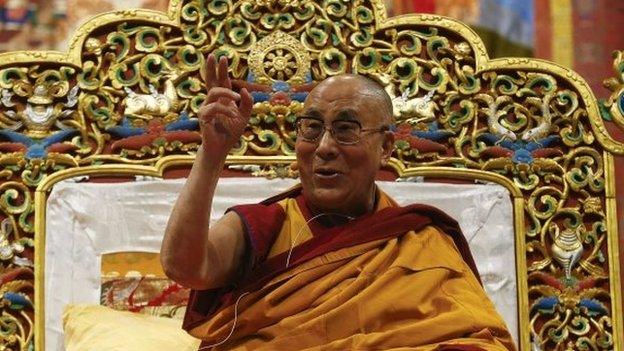
- Published17 December 2014
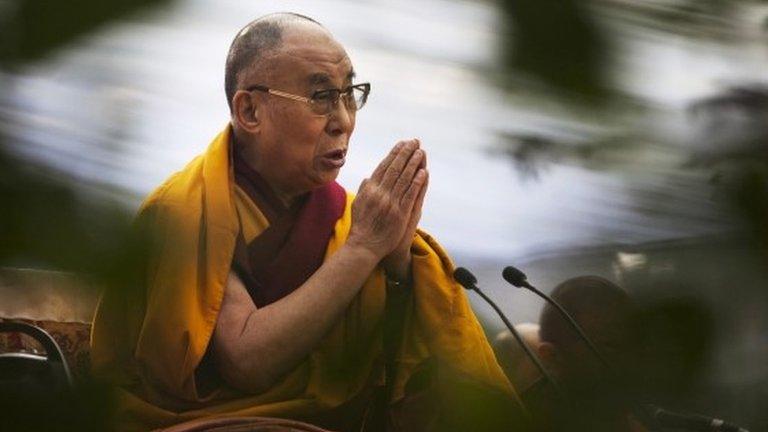
- Published12 December 2014
